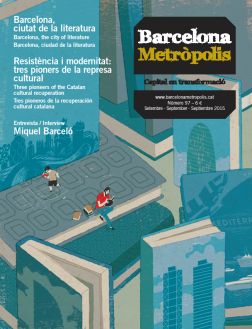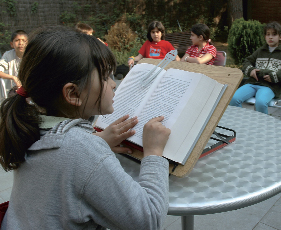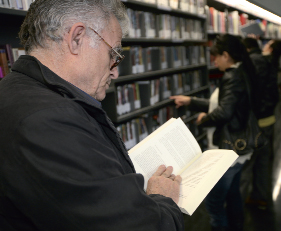For centuries, Barcelona has been committed to the book sector and intends to continue to uphold this commitment, now as a UNESCO City of Literature. This issue addresses all the realities that define what literature means to Barcelona, and seeks to explore the reasons why it aspires to the UNESCO title.
Books filled the city in September. We are not referring only to textbooks because of the start of the school year. Books literally came out onto the streets, meeting up with residents at the cathedral during Catalan Book Week, and subsequently at the Second-Hand Book Fair in Passeig de Gràcia. For a few days, these sites became meeting points for new and old, literary and professional, children’s and young people’s books and books for all ages. They brimmed with activities that united the street, writers, residents and literature.
During the course of the year, numerous events bring books to the fore in different city locations, and also unite authors and readers. These include Barcelona Negra, Poetry Week, Món Llibre for youngsters, and Kosmopolis, the self-defined amplified literature festival. And let us not forget World Book Day, on St George’s Day (Sant Jordi), as the publishing world event par excellence. Book-lovers and newcomers to reading throng festivals, bookshops and libraries.
For writers, the city is a source of inspiration, as well as a haven. Some ten years ago, PEN Català, with the City Council’s support, contributed to creating a network of city-havens for threatened writers to facilitate the right to freedom of expression that is denied to them in their places of origin. This initiative ties in with the proposal from the mayor’s office to create a cluster of cities to welcome even more refugees, such as those fleeing from the war in Syria.
Barcelona has become the Iberian Peninsula’s publishing capital in terms of number of titles and turnover (excluding school and official books), where almost 300 publishers bring out more than 30,000 titles a year and employ some 5,300 professionals. The city is home to multinationals that use it as a platform to access the Spanish and Hispano-American markets. However, it is also a place that welcomes small publishers with personality, that are just starting out and are trying to carve a niche for themselves.
The programme for hosting threatened writers, the distribution network provided by libraries and bookshops, the broad range of festivals and trade fairs with a potential to embrace more readers, the publishing sector that makes Barcelona the publishing capital, World Book Day, the Casa Vil·la Joana museum project, and corners that ooze literature or have inspired stories that became books… These realities and on-going projects, as well as Barcelona’s capacity to create international bonds and networks, have led to its candidacy as a UNESCO City of Literature, an opportunity to continue promoting local culture, here and everywhere, with the help of the book world.
This issue addresses all the realities that define what literature means to Barcelona, and seeks to explore the reasons why it aspires to the UNESCO title. We begin from the distant past, when the city set up what Sergio Vila-Sanjuán called “a comprehensive book ecosystem”. And we conclude with some food for thought about the future by Antoni Martí Monterde. Monterde believes that, beyond literature, Barcelona has to rethink itself as a cultural capital, and adds that “being a UNESCO city is the recognition of a structure in which the literary book plays a fundamental role in citizens’ lives, something more than one of its economic driving forces, which it undoubtedly is too”.
For centuries, Barcelona has been committed to the book sector and intends to continue to uphold this commitment, now as a UNESCO City of Literature. Networking with other cities allows it to share and exchange experiences that drive creativity, while also bringing literature closer to the citizens in all neighbourhoods. Barcelona will continue to work to decentralise festivals, to further foster the untiring work done by libraries, to support neighbourhood bookshops – which in many cases have become cultural facilitators –, to spread educational programmes to promote reading, and to continue to spearhead high-quality literary and publishing initiatives.





